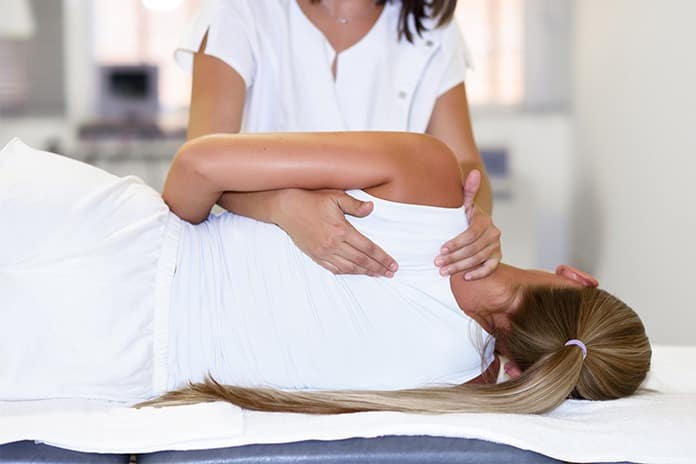A course of postnatal physio is a great way of ensuring your body gets back to where you want it to be after childbirth. We look into the many benefits
Pregnancy and childbirth has a tremendous impact on a woman’s body, not only in the nine months of carrying, but also in the weeks and months after delivery. Understanding exactly how your body is healing and recovering is an important part of your postnatal journey and getting assessed by an expert will ensure you have the most positive experience possible. A complete assessment of your back, pelvis, posture, pelvic floor and abdominal muscles will identify areas which are recovering and which may need a bit of strengthening. Any niggles in these areas may affect the quality of your sleep, the bond you have with your new baby, your libido and getting back to exercise. A course of postnatal physio is a way of ensuring that your body bounces back after birth so you can focus fully on the little one.
ABDOMINAL MUSCLES & PELVIC FLOOR
All women will experience muscle weakness of the abdominals and pelvic floor after pregnancy, even after a caesarian. If not looked at and strengthened, there’s a risk that you could go on to develop back pain, pelvic pain or bladder and bowel weakness down the line. These conditions aren’t an inevitability of childbirth or something you have to live with forever and can be treated with effective and specialised physio treatment. By examining your stomach muscles, they’ll look out for diastasis and whether you’ve still got a big distended stomach. They’ll check how well you’re able to activate the core, as well as look out for symptoms of bladder and bowel problems or control issues. Are you getting any leaking? Any sensation of any prolapse or pain in the pelvic region? By consenting to a vaginal examination, your practitioner will be able to test your pelvic floor strength and endurance. They will also recommend a number of exercises while you are pregnant, which can be continued after the birth, two days after a vaginal birth and around five after a caesarian. This will typically be a variety of pelvic floor exercises and transversus abdominis co-contractions which encourage the muscle fibres to function normally again.
EASES ACHES AND PAINS
Though aches and pains can be common after pregnancy, they shouldn’t persist. It’s not normal to have back pain, or rib pain, or pelvic pain – lots of people get it because of the changes that your body goes through during pregnancy – but it shouldn’t persist and it is treatable. From six weeks onwards, postnatal body check-ups will give you a thorough assessment of the back, the spine and the pelvis to address any niggles in these areas. From there, your physio will be able to give you specific advice about getting your body back to where you want it.
BACK PAIN PREVENTION
After your baby is born, it’s important to follow a series of exercises to strengthen the muscles which have been stretched by pregnancy and birth. This will help to prevent backache and promote correct posture. Your circulation and breathing will also benefit. Through postnatal physiotherapy, you’ll get expert advice about lifting and handling techniques, so as to avoid back injuries and protect from pelvic organ prolapse.
RELIEVES STRESS
Being a new mum doesn’t just bring about physical changes, it’ll overhaul your lifestyle. Putting practises in place to reduce stress will go a long way in making the weeks and months following the birth as lovely and enjoyable as they should be. Physiotherapy can help manage stress and stress symptoms by correcting muscle imbalance, improving strength and reducing pain. Your practitioner will be able to advise on things like correct breathing technique which is clinically proven to lower cortisol levels, improve relaxation, and improve concentration.
SAFE RETURN TO EXERCISE
Getting back into exercise after pregnancy can help you recover after the birth itself, make you stronger and improve mood. Even if you’re tired and feeling unmotivated, there’s plenty you can do to get your body moving. But how soon you start exercising depends on your body and individual circumstances. Your physiotherapist will be able to advise you on this, easing you back into it so that you don’t overdo it. First and foremost, it’s crucial that your pelvic floor and abdominals are strong enough before you get back into gentle exercise. Again, a physiotherapist will be able to advise on when the time is right.
For more information about SixPhysio, visit sixphysio.com







COMMENTS ARE OFF THIS POST